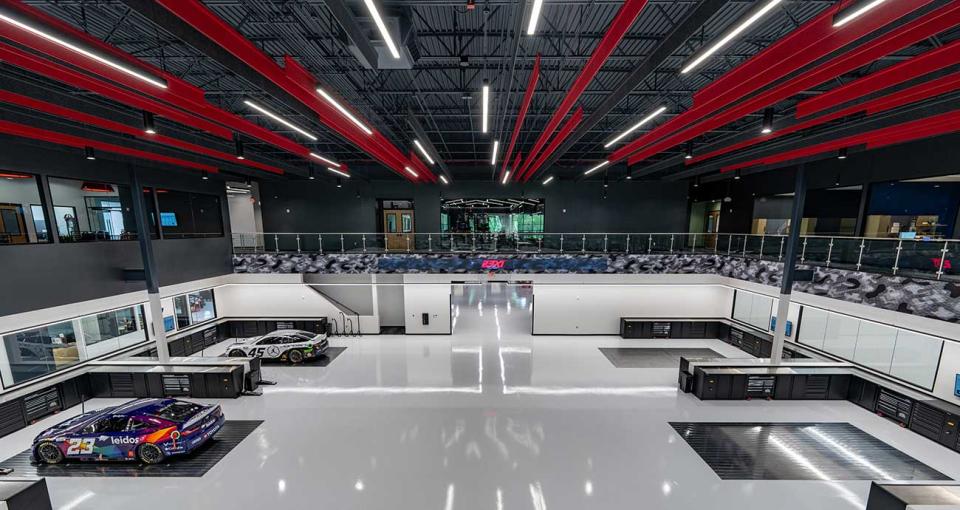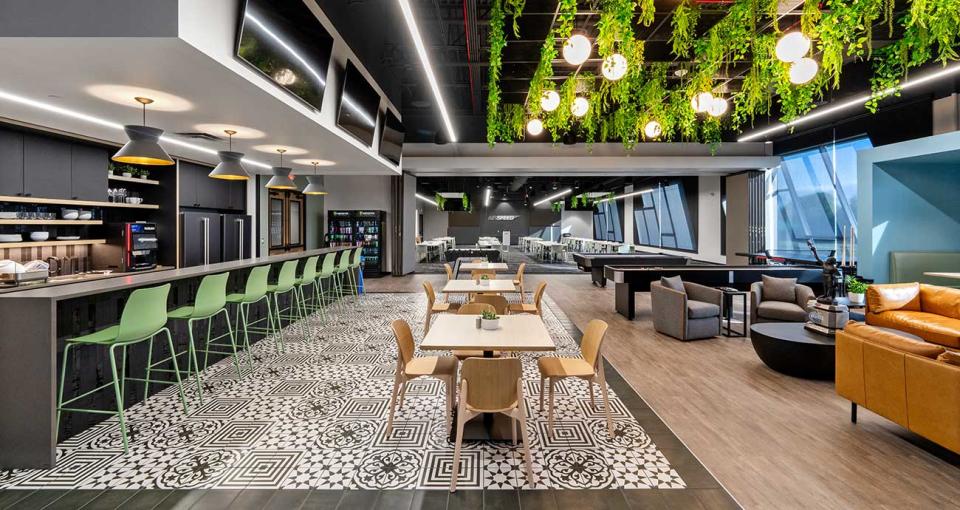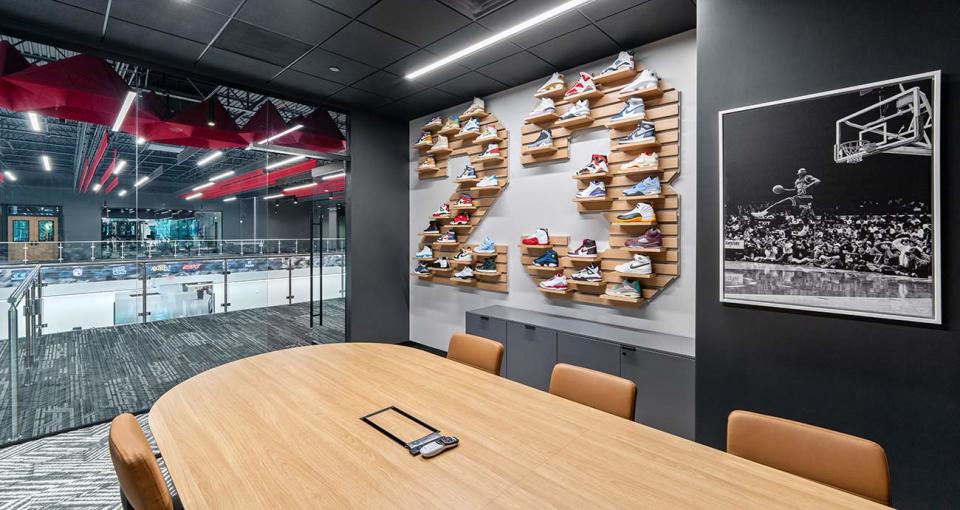Sports
Inside Airspeed, 23XI Racing’s ‘all-in’ headquarters with a Silicon Valley flair

HUNTERSVILLE, N.C. — Denny Hamlin wanted 23XI Racing’s new headquarters to be different and a major leap forward for new NASCAR team facilities. He also wanted the details to matter, and the 43-year-old driver — a team co-founder with friend, associate and NBA legend Michael Jordan — saw to those details personally.
The greenery hanging above the lounge area in the team’s break room? Hamlin spent hours placing them, at the cost of an aching back. The 45 Air Jordan shoes arranged to form the No. 23 in a meeting-room wall display? All are extras that Hamlin pulled from his storage. The tiles, wood and other surfaces — down to the choice of laminate style in the bathroom stalls? Hamlin sorted through scads of samples and swatches to find the right fit.
“I wanted it to feel like the Google of race shops,” Hamlin said during a tour last week, and indeed there’s a Silicon Valley feel to the 114,000-square-foot building. But “race shop” is not what those involved are calling it, since that almost downplays what the place is aiming to achieve. And if there were a version of a “race shop” swear jar at the front desk in the lobby — the one with the bespoke elephant-print backdrop plucked from the Jordan Brand color palette looming behind it — it wouldn’t seem out of place.
RELATED: Cup Series standings | Hamlin tops Power Rankings
With those ground rules understood Airspeed opened its doors to the public last week, welcoming fans and giving them a glimpse at the operations involved with one of stock-car racing’s growing teams. When the organization launched in 2020, the team’s name was a composite of Jordan’s uniform — No. 23 — and Hamlin’s car — No. 11 — the latter stylized in Roman numeral form. The name of the headquarters — coined by longtime Jordan business manager Curtis Polk — is also an amalgam, combining Jordan’s “Air” nickname with Hamlin’s on-track speed.
“This is not a race shop. It’s a place that we work, yes, we put cars on the track, but it’s so much more than that,” Hamlin says. “Would you say sitting right here, we’re in a race shop? No, it certainly doesn’t feel that way. So I think what we were in — in Mooresville, in the old Germain (Racing) building — was a race shop and a garage. This is not. This is something that is different, and so it needs to be named appropriately.”
The unique name and surroundings seem to fit for a team born on the cusp of the sport’s Next Gen era. Hamlin went to work in 2021 with the first concept sketches of what the organization’s new home might look like. Working with Charlotte-based design firm Merriman Schmitt Architects and Choate Construction, the first walls went up just over a year ago. Facing and meeting a firm deadline of Jan. 1, the team remarkably moved in eight months later to prepare for the season.

What greeted fans at the premiere was not just an interactive video wall and windows into the various departments, but an innovative work-bay space that feels like an arena below the square, raised concourse one floor up. Hamlin drew inspiration from the Mercedes-AMG Petronas Formula 1 team’s work area, among other influences, and the 23XI cars for drivers Tyler Reddick and Bubba Wallace pop with color against the sterile, hospital-white floors.
Other charming details abound, from the serendipitous 23 interior paint choices exclusively with colors from the Jordan Brand catalog to the intentional 23-degree tilt of the windows that ring the building and create an airy space. “A lot of us have worked in dungeons in racing,” says Mike Wheeler, former crew chief and now 23XI Racing’s senior director of planning and operations, noting the contrast. This building is no dank warehouse, and Hamlin has maximized the open floor plan, which gives him panoramic views of the different departments and the ability to locate personnel quickly across the building.
“It’s nuts. What we were in, compared to what we have now, it’s almost incomparable,” Reddick said last weekend at Charlotte Motor Speedway. “It was crazy we were doing the things we were out of the space that we had. We were split in different buildings and we were all just kind of spread out, and it’s great to be under one roof like we are now.”
Other intentional design choices have a direct impact on 23XI’s competition prep. Cars roll from department to department along a purpose-built workflow line before loading and unloading in the team’s haulers, parked aat the far end from the main entrance. Like most tier-one teams, 23XI has a race-day war room staffed by roughly a dozen competition staffers for a given event. “I’m amazed, being a past crew chief, how much calmer it is here than on the pit box,” Wheeler says from the theater-style rows of workstations facing a bank of flat-screen displays.


Crew chiefs and engineers shunned traditional offices to work at desk clusters that make direct communication easier. “We want to just be able to do this right here, talk right to each other,” Hamlin says. “That’s really, really important for us as how we run as a team, and for each team to be able to just talk right over and discuss strategy.”
The competition side is one component, but building a strong support staff is another. Hamlin estimates that the 23XI Racing workforce is now roughly 100 people, saying that company-wide “welcome to the team” e-mails introducing new members have arrived in internal inboxes at a regular clip.
Airspeed and its amenities have been used as a recruiting tool, both for sponsorship partners and for its growing list of employees. Hamlin says 23XI Racing has made an effort to reach outside of the NASCAR industry for prospective job candidates, and the organization has earned recognition from a Sports Business Journal survey on its Best Places to Work in Sports list.
“It’s cool to see it all come together, and people are thriving there,” Wallace says. “I think people love showing up to work there, and that’s what you need because these seasons are long, and so you’ve got to have that camaraderie and that sex appeal that we call it, to just show up and want to work.”
The team’s on-track efforts so far are represented in the lobby with the winning cars from 23XI Racing’s first Cup Series victory and its sixth and most recent. Wallace’s confetti-covered No. 23 Toyota faces Reddick’s No. 45 Jordan Brand Camry XSE, with the main doors in between. Both cars are flanked by the sculpted Vulcan trophies — 130-plus pounds each of solid iron — from their Victory Lane visits at Talladega Superspeedway.
Another case with room for more trophies sits upstairs. Hardware from some of Hamlin’s 54 Cup Series wins sits nearby.
“I love empty trophy cases. It’s motivation,” Hamlin says. “Only been around a little while, but we do have a few. This will grow. This will grow, for sure.”


There’s room for physical growth as well. Airspeed currently sits on approximately nine of the 16 acres that the team purchased off Interstate 77. As for the remaining seven acres, Airspeed is capable of expansion from its back walls, and the land will also be used as a permanent home for its pit crews to practice, replacing the portion of the parking lot where 23XI’s over-the-wall personnel currently get their reps.
Hamlin politely declines to disclose dollar figures when asked how much the venture cost, other than to say, “a lot.” He recalls how the former Kyle Busch Motorsports shop was regarded as “out-of-this-world expensive” when completed in 2010. Airspeed, he says, is “much, much, much more — a few multiples on that.”
Still, Hamlin says the foundation that 23XI has established represents an investment in the sport’s future. That commitment, he says, draws on the passion that he and Jordan share.
“I think Michael said it correctly that we are all-in on the sport,” Hamlin says, “and I think that if you walk through here, there’s no way you can question that. From the performance that we’ve put on the race track to what we’ve built here, I can’t imagine anyone coming in in three years, and spending this kind of investment to be all-in on the sport.”





